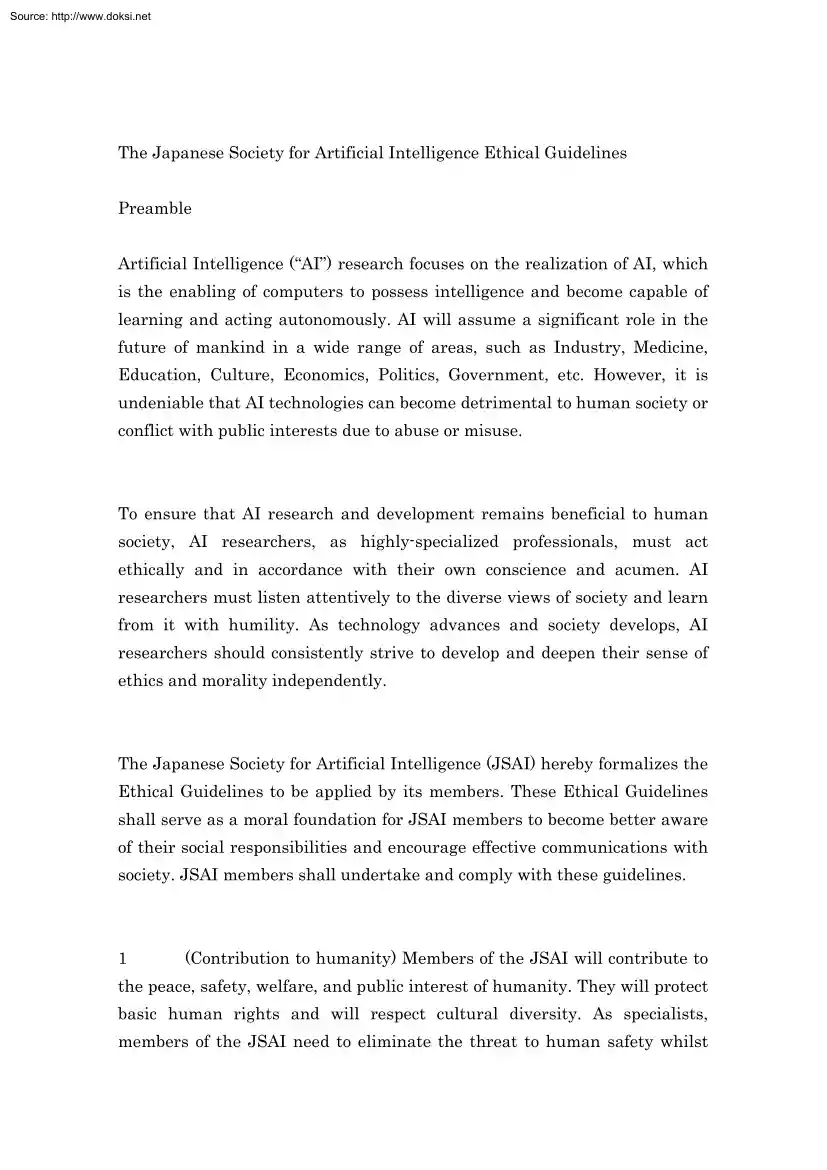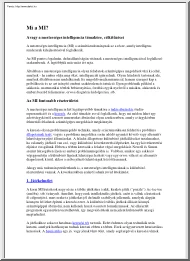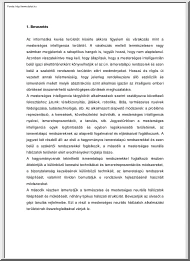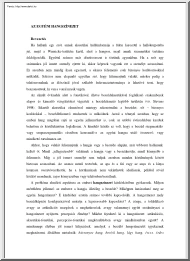Datasheet
Year, pagecount:2017, 3 page(s)
Language:English
Downloads:4
Uploaded:July 19, 2018
Size:474 KB
Institution:
-
Comments:
Attachment:-
Download in PDF:Please log in!
Comments
No comments yet. You can be the first!Most popular documents in this category
Content extract
Source: http://www.doksinet The Japanese Society for Artificial Intelligence Ethical Guidelines Preamble Artificial Intelligence (“AI”) research focuses on the realization of AI, which is the enabling of computers to possess intelligence and become capable of learning and acting autonomously. AI will assume a significant role in the future of mankind in a wide range of areas, such as Industry, Medicine, Education, Culture, Economics, Politics, Government, etc. However, it is undeniable that AI technologies can become detrimental to human society or conflict with public interests due to abuse or misuse. To ensure that AI research and development remains beneficial to human society, AI researchers, as highly-specialized professionals, must act ethically and in accordance with their own conscience and acumen. AI researchers must listen attentively to the diverse views of society and learn from it with humility. As technology advances and society develops, AI researchers should
consistently strive to develop and deepen their sense of ethics and morality independently. The Japanese Society for Artificial Intelligence (JSAI) hereby formalizes the Ethical Guidelines to be applied by its members. These Ethical Guidelines shall serve as a moral foundation for JSAI members to become better aware of their social responsibilities and encourage effective communications with society. JSAI members shall undertake and comply with these guidelines 1 (Contribution to humanity) Members of the JSAI will contribute to the peace, safety, welfare, and public interest of humanity. They will protect basic human rights and will respect cultural diversity. As specialists, members of the JSAI need to eliminate the threat to human safety whilst Source: http://www.doksinet designing, developing, and using AI. 2 (Abidance of laws and regulations) Members of the JSAI must respect laws and regulations relating to research and development, intellectual property, as well as any
other relevant contractual agreements. Members of the JSAI must not bring harm to others through violation of information or properties belonging to others. Members of the JSAI must not use AI with the intention of harming others, be it directly or indirectly. 3 (Respect for the privacy of others) Members of the JSAI will respect the privacy of others with regards to their research and development of AI. Members of the JSAI have the duty to treat personal information appropriately and in accordance with relevant laws and regulations. 4 (Fairness) Members of the JSAI will always be fair. Members of the JSAI will acknowledge that the use of AI may bring about additional inequality and discrimination in society which did not exist before, and will not be biased when developing AI. Members of the JSAI will, to the best of their ability, ensure that AI is developed as a resource that can be used by humanity in a fair and equal manner. 5 (Security) As specialists, members of the JSAI
shall recognize the need for AI to be safe and acknowledge their responsibility in keeping AI under control. In the development and use of AI, members of the JSAI will always pay attention to safety, controllability, and required confidentiality while ensuring that users of AI are provided appropriate and sufficient information. 6 (Act with integrity) Members of the JSAI are to acknowledge the significant impact which AI can have on society. They will therefore act with integrity and in a way that can be trusted by society. As specialists, members of the JSAI will not assert false or unclear claims and are obliged to explain the technical limitations or problems in AI systems truthfully and in a Source: http://www.doksinet scientifically sound manner. 7 (Accountability and Social Responsibility) Members of the JSAI must verify the performance and resulting impact of AI technologies they have researched and developed. In the event that potential danger is identified, a warning
must be effectively communicated to all of society. Members of the JSAI will understand that their research and development can be used against their knowledge for the purposes of harming others, and will put in efforts to prevent such misuse. If misuse of AI is discovered and reported, there shall be no loss suffered by those who discover and report the misuse. 8 (Communication with society and self-development) Members of the JSAI must aim to improve and enhance society’s understanding of AI. Members of the JSAI understand that there are diverse views of AI within society, and will earnestly learn from them. They will strengthen their understanding of society and maintain consistent and effective communication with them, with the aim of contributing to the overall peace and happiness of mankind. As highly-specialized professionals, members of the JSAI will always strive for self-improvement and will also support others in pursuing the same goal. 9 (Abidance of ethics
guidelines by AI) AI must abide by the policies described above in the same manner as the members of the JSAI in order to become a member or a quasi-member of society. The guidelines will be announced after the committee meeting. The interpretation and review of the guidelines will be conducted during the committee meeting and approval from the committee must be obtained prior to its finalization
consistently strive to develop and deepen their sense of ethics and morality independently. The Japanese Society for Artificial Intelligence (JSAI) hereby formalizes the Ethical Guidelines to be applied by its members. These Ethical Guidelines shall serve as a moral foundation for JSAI members to become better aware of their social responsibilities and encourage effective communications with society. JSAI members shall undertake and comply with these guidelines 1 (Contribution to humanity) Members of the JSAI will contribute to the peace, safety, welfare, and public interest of humanity. They will protect basic human rights and will respect cultural diversity. As specialists, members of the JSAI need to eliminate the threat to human safety whilst Source: http://www.doksinet designing, developing, and using AI. 2 (Abidance of laws and regulations) Members of the JSAI must respect laws and regulations relating to research and development, intellectual property, as well as any
other relevant contractual agreements. Members of the JSAI must not bring harm to others through violation of information or properties belonging to others. Members of the JSAI must not use AI with the intention of harming others, be it directly or indirectly. 3 (Respect for the privacy of others) Members of the JSAI will respect the privacy of others with regards to their research and development of AI. Members of the JSAI have the duty to treat personal information appropriately and in accordance with relevant laws and regulations. 4 (Fairness) Members of the JSAI will always be fair. Members of the JSAI will acknowledge that the use of AI may bring about additional inequality and discrimination in society which did not exist before, and will not be biased when developing AI. Members of the JSAI will, to the best of their ability, ensure that AI is developed as a resource that can be used by humanity in a fair and equal manner. 5 (Security) As specialists, members of the JSAI
shall recognize the need for AI to be safe and acknowledge their responsibility in keeping AI under control. In the development and use of AI, members of the JSAI will always pay attention to safety, controllability, and required confidentiality while ensuring that users of AI are provided appropriate and sufficient information. 6 (Act with integrity) Members of the JSAI are to acknowledge the significant impact which AI can have on society. They will therefore act with integrity and in a way that can be trusted by society. As specialists, members of the JSAI will not assert false or unclear claims and are obliged to explain the technical limitations or problems in AI systems truthfully and in a Source: http://www.doksinet scientifically sound manner. 7 (Accountability and Social Responsibility) Members of the JSAI must verify the performance and resulting impact of AI technologies they have researched and developed. In the event that potential danger is identified, a warning
must be effectively communicated to all of society. Members of the JSAI will understand that their research and development can be used against their knowledge for the purposes of harming others, and will put in efforts to prevent such misuse. If misuse of AI is discovered and reported, there shall be no loss suffered by those who discover and report the misuse. 8 (Communication with society and self-development) Members of the JSAI must aim to improve and enhance society’s understanding of AI. Members of the JSAI understand that there are diverse views of AI within society, and will earnestly learn from them. They will strengthen their understanding of society and maintain consistent and effective communication with them, with the aim of contributing to the overall peace and happiness of mankind. As highly-specialized professionals, members of the JSAI will always strive for self-improvement and will also support others in pursuing the same goal. 9 (Abidance of ethics
guidelines by AI) AI must abide by the policies described above in the same manner as the members of the JSAI in order to become a member or a quasi-member of society. The guidelines will be announced after the committee meeting. The interpretation and review of the guidelines will be conducted during the committee meeting and approval from the committee must be obtained prior to its finalization





